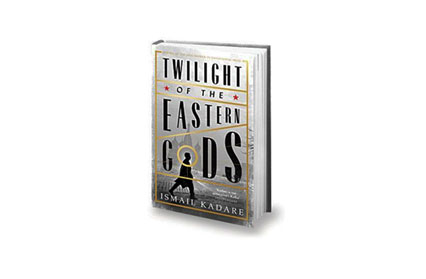B.J. Epstein reviews Twilight of the Eastern Gods by Ismail Kadare, a novel about the importance of literature in the Soviet Union.
Twilight of the Eastern Gods is, at its heart, a novel about words and writing. It is about telling stories, and the importance of literature. It is also an ominous tale about politics, history, and geography, exploring the Soviet era and its concomitant political beliefs. Since the time and place frequently are depicted as rather creepy here, writing, too, can seem to be a suspicious activity.
The main character is a young foreign writer who has gone to study in a literary institute in the Soviet Union. All the students are well-known writers from their own regions, but despite their drinking and partying, they are not typical students:
‘At long last, after overcoming their adversaries, having accused them of Stalinism, liberalism, bourgeois nationalism, Russophobia, petty nationalism, Zionism, modernism, folklorism, etc., having crushed their literary careers and banned the publication of their works, having hounded them into alcoholism or suicide, or, more simply, having had them deported, that is to say, after having done what had had to be done, they had been inspired to come to the Gorky Institute to complete their literary education.’
Completing their literary education, it seems, involves dedicating themselves to Socialist Realism, which does not quite work for our protagonist, who sometimes thinks about and employs the folklore of his native country in his writing and his everyday life.
In other words, though the Institute and the harsh political situation seem to conspire to disenchant the students in regard to literature (and also in regard to other aspects of their lives, such as romance), the protagonist still retains his passion for the written word, even if he just barely does so.
From a translation angle, an interesting aspect of this book is that it is a relay translation, albeit one that was delayed by thirty-three years. Jusuf Vrioni translated Ismail Kadare’s novel from Albanian to French, and pre-eminent translator David Bellos used Vrioni’s text to make the novel available in English (rather than translating from Albanian to English, in other words).
Bellos includes a helpful introduction to the novel, explaining some of the context behind it. He notes that the work ‘re-creates Kadare’s experience of this strange “factory of the intellect” [i.e. the Gorky Institute for World Literature in Moscow], set up to produce new generations of socialist poets, novelists and playwrights.’ Kadare apparently wrote and rewrote chapters of Twilight of the Eastern Gods over fifteen years, and the novel was not first published until 1978 (the French version by Jusuf Vrioni appearing three years later, and it included sections that Kadare felt he had to take out of the Albanian original). Some aspects of the novel would be hard, or harder, to follow without Bellos’s information, or even without larger knowledge of the historical period (for example, Antaeus the Greek’s situation).
While the novel is about the general themes mentioned above, it is based on an actual event: Boris Pasternak being awarded the Nobel Prize in Literature, much to the displeasure of the Soviet powers-that-be. Bellos discusses how ‘[t]he account of the Pasternak campaign given in Twilight of the Eastern Gods has nothing fictional about it: the discovery of a part of the typescript in the Writers’ Union residence, the co-ordination of the press, radio and television campaign, the roles of specific individuals, right down to the inexplicably sudden halt – all these things really happened…it is also clear from this account of the persecution of Pasternak that Kadare could imagine finding himself in the same situation.’ Indeed, Kadare did face similar charges and complaints as did Pasternak, ‘but in the end his real response to the constraints of living as an international writer under a paranoid, isolationist Communist regime was to write a novel that is also a declaration of fidelity to Albania and its ancient folk culture.’ This duality – loyalty to both a place and to freedom of ideas – comes through very clearly in the novel.
In short, Twilight of the Eastern Gods is a fictionalised account of Ismail Kadare’s own experiences, and it sheds light – even if only twilight – on a challenging historical, cultural, and political period, while also encouraging the reader to recognise and admire the power of literature.
193 pp., Edinburgh: Canongate, 2014.
Translation by David Bellos from the French translation by Jusuf Vrioni
Recommended for you:
Glen James Brown reviews The Book of Katerina, the acclaimed Greek novel from Auguste Corteau – translated by Claire Papamichail – in which the author envisions his mother’s own complex inner life following generations of illness and misfortune.











